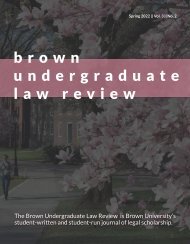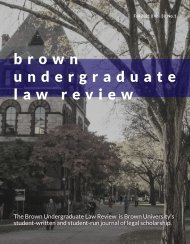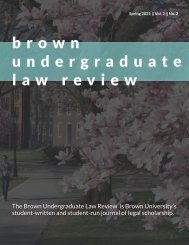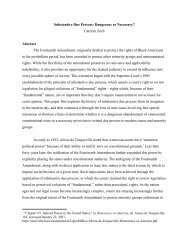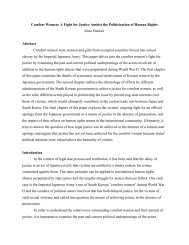Brown Undergraduate Law Review -- Vol. 2, No. 1 (Fall 2020)
We are proud to present the Brown Undergraduate Law Review's Fall 2020 issue. We hope you will all find our authors' works fascinating and thought-provoking.
We are proud to present the Brown Undergraduate Law Review's Fall 2020 issue. We hope you will all find our authors' works fascinating and thought-provoking.
Create successful ePaper yourself
Turn your PDF publications into a flip-book with our unique Google optimized e-Paper software.
Was Privacy a Mistake? An Examination of Privacy, Liberty, and Equality in Reproductive Freedom
order to prevent a woman from undergoing an abortion,
Casey loosens this restriction, instituting that state
regulations are valid as long as they do not present an
?undue burden.? 31
Finally, in Lawrence, Justice Kennedy further reiterates the
emerging duality between liberty and equality in instances
of sexual freedom, writing in the Court?s opinion,
?Equality of treatment and the due process right to demand
respect for conduct protected by the substantive guarantee
of liberty are linked in important respects, and a decision
on the latter point advances both interests.? 32 Yet, as with
the ultimate rulings in Roe and Casey, in Lawrence, the
Court yet again only relies on notions of privacy and
liberty in its decision, mirroring its inability to affirm the
reliance between liberty and equality in instances of bodily
autonomy in contemporary case law.
The importance of recognizing Casey?s acknowledgement
of the validity of utilizing an equal protection framework
to grant women reproductive freedom, as well as
Lawrence?s allowing of individuals to engage in whatever
type of sexual intercourse they wish to engage i, is found
in the fact that the reliance of these rulings on a privacy
the language of the Fourteenth Amendment does not hold
to be true. As Justice Blackmun articulates in the Court?s
opinion,
The Constitution does not define ?person? in so many
words. Section 1 of the Fourteenth Amendment
contains three references to ?person.? The first, in
defining ?citizens,? speaks of ?persons born or
naturalized in the United States.? All this, together
with our observation, supra, that throughout the major
portion of the 19th century prevailing legal abortion
practices were far freer than they are today, persuades
us that the word ?person,? as used in the Fourteenth
Amendment, does not include the unborn. 33
When examining the language of the Fourteenth
Amendment, it becomes clear that an unborn fetus is not a
?person? entitled to the same rights and protections of the
laws that living ?persons? are entitled to. Thus, according
to concepts of equal protection as established in the
Constitution, states fail to maintain a compelling interest in
protecting the life of the unborn fetus, as the life, liberty,
and pursuit of happiness of the women who wish to
receive an abortion are of greater constitutional concern.
framework empowers the establishment of state Therefore, the Fourteenth Amendment and its equal
restrictions. That is, the Court?s decision to continuously
grant women abortion rights under the right to privacy has
essentially given states the room to formulate a compelling
interest in the potential life of the unborn fetus and
therefore regulate abortion procedures. Thus, while it is
clear that the Court recognizes the equal protection issue at
protection component simultaneously invalidate any
claims or moral arguments made for the rights of the
unborn fetus, while also establishing the right of women to
seek and demand equal status and true, achievable liberty
by becoming empowered to make their own reproductive
choices.
play in granting women reproductive freedom,
Conclusion
itsresistance to formulating itsruling under a proceduralist
framework allows abortion rights to often lose strength to
moral concerns regarding the life of the terminated fetus.
In demonstrating how the right to privacy in cases of
granting abortion rights is ultimately reliant on the
achievement of liberty, which itself is dependent on the
However, as emphasized in Roe, the claim that a fetus is a
realization of equality, I hope to have revealed the
?person? deserving of equal protection and rights within
31. Ibid.
32. Lawrence, 539 U.S. 575.
33. Roe v. Wade, 410 U.S. 157.
Brown Undergraduate Law Review
50




